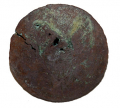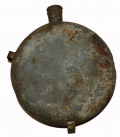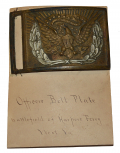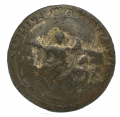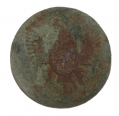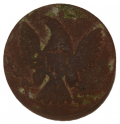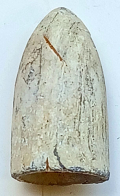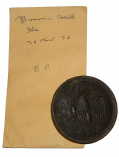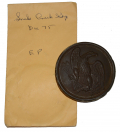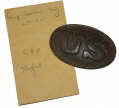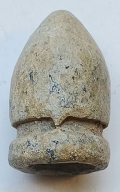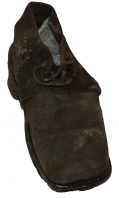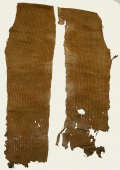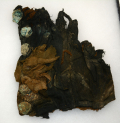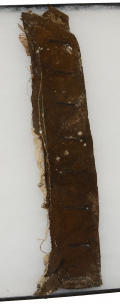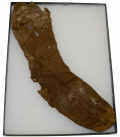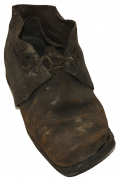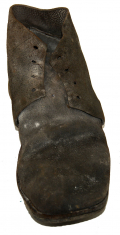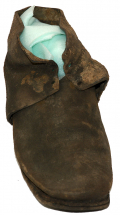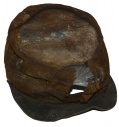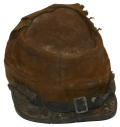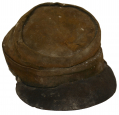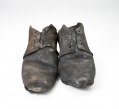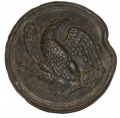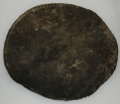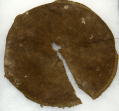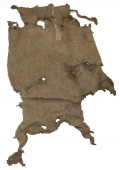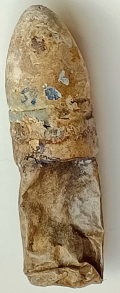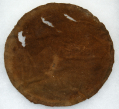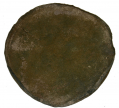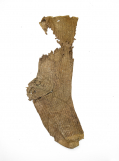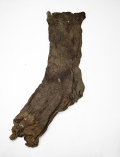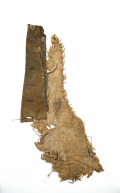site search
online catalog
Relics
Showing 101 to 150 out of 367
SOUVENIR RELIC RING FROM FISHER’S HILL BATTLEFIELD
This ring is accompanied by short presentation note signed by Mr. Joseph Fisher of Strasburg, Va. The note indicates it was “made from a cap of a shell (?) found on Fisher’s Hill Battle-Field… (846-424). Learn More »
US CAVALRY MANN’S PATENT CARTRIDGE BOX EX-LEES HQ MUSEUM
The Mary Thompson house at Gettysburg, used by Lee as his headquarters at Gettysburg, was recognized by its owner in the 1890s as a valuable battlefield relic, perhaps a particular attraction for… (224-750). Learn More »
US GENERAL SERVICE EAGLE COAT BUTTON RECOVERED AT 3RD CORPS HOSPITAL SITE, GETTYSBURG – KEN BREAM COLLECTION
Dark chocolate patina; has some damage to face – a crack and a few small holes. Some verdigris present. Shank present; more verdigris on reverse. There appears to be a backmark present but it is no… (1163-198A). Learn More »
CONFEDERATE “PIE-PLATE” TIN DRUM CANTEEN
This is an interesting variation on the tin drum canteens that became very popular in the 1850s following the adoption of round drum-shaped tin canteen with convex sides by the US Army in 1836, though… (490-6762). Learn More »
MODEL 1851 SWORD BELT PLATE FROM HARPERS FERRY ON A GREAT DISPLAY CARD
This sword belt plate, a very good example of an early pick-up, is mounted on a great old card typical of early relic displays labeled in brown ink, “Officers Belt Plate / battlefield of Harpers… (1202-196). Learn More »
CIVIL WAR NORTH CAROLINA STATE SEAL BUTTON WITH STAR BACKMARK, TRACES OF SILVER
Civil War North Carolina state seal button with “NORTH CAROLINA” along the top edge and figures of Liberty and Plenty at center. Unmarked, but with small single star in the channel on the back.… (2024-703). Learn More »
CIVIL WAR-INDIAN WAR FORAGE CAP VISOR
This is a well preserved leather visor from a forage cap recovered at Fort Pembina, ND, where it was preserved in remarkable condition by wet, anaerobic soil conditions. This is typical of the simple… (1052-480). Learn More »
CIVIL WAR-INDIAN WAR FORAGE CAP VISOR
This is a well preserved leather visor from a forage cap recovered at Fort Pembina, ND, where it was preserved in remarkable condition by wet, anaerobic soil conditions. This is typical of the simple… (1052-483). Learn More »
US GENERAL SERVICE EAGLE COAT BUTTON RECOVERED AT 3RD CORPS HOSPITAL SITE, GETTYSBURG – KEN BREAM COLLECTION
Light green color to face, with light chocolate patina to body of eagle. Reverse is also green in color; shank present. No visible backmark. This button was found by local Gettysburg resident and… (1163-219F). Learn More »
US GENERAL SERVICE EAGLE COAT BUTTON RECOVERED AT 3RD CORPS HOSPITAL SITE, GETTYSBURG – KEN BREAM COLLECTION
Reddish chocolate patina with a few spots of verdigris on face. Shank present – somewhat loose though still securely held within the two sections of the button. No visible backmark. This button… (1163-219C). Learn More »
GETTYSBURG WITNESS TREE TRAY
This item was custom made by Todd Orndorff from reclaimed wood from a Witness Tree that once stood on the grounds bordering the Bloody Wheatfield on the Gettysburg battlefield. The oak tree would have… (1250-01). Learn More »
GETTYSBURG WITNESS TREE TRAY
This item was custom made by Todd Orndorff from reclaimed wood from a Witness Tree that once stood on the grounds bordering the Bloody Wheatfield on the Gettysburg battlefield. The oak tree would have… (1250-03). Learn More »
GETTYSBURG WITNESS TREE COASTER SET
This item was custom made by Todd Orndorff from reclaimed wood from a Witness Tree that once stood on the grounds bordering the Bloody Wheatfield on the Gettysburg battlefield. The oak tree would have… (1250-04). Learn More »
.69 CALIBER "NO-RING PRUSSIAN" BULLET
This was for the .69 caliber rifled muskets being used in the Federal service. These were machine "pressed and turned" bullets made at a Federal arsenal. This particular style features no grooves,… (2024-919). Learn More »
RELIC U.S. ENLISTEDMAN’S EAGLE BREAST PLATE FROM BROWN’S MILL, GEORGIA, RECOVERED BY SID KIRKSIS
This excavated Pattern 1839 US cartridge box shoulder sling plate (Eagle breast plate) has a smooth brown patina. The brass face features an eagle clutching arrows and an olive branch. The plate’s… (490-6828). Learn More »
RELIC U.S. ENLISTEDMAN’S EAGLE BREAST PLATE FROM SNAKE CREEK GAP, RECOVERED BY SID KIRKSIS
This excavated Pattern 1839 US cartridge box plate has a smooth brown patina on the face. The oval brass face features a raised “US”. The plate’s reverse has 99% of the lead fill. The two iron… (490-6829). Learn More »
RELIC U.S. ENLISTEDMAN’S CARTRIDGE BOX PLATE MARKED “E. GAYLORD” FROM KENTUCKY, RECOVERED BY SYD KIRKSIS
This excavated Pattern 1839 US cartridge box plate has a smooth brown patina on the face. The oval brass face features a raised “US”. The plate’s reverse has 99% of the lead fill. The two iron… (490-6831). Learn More »
RARE CLEBURNE BULLET – DEAN THOMAS COLLECTION
Dug Confederate “Cleburne” bullet .54 caliber. This is a rare Confederate bullet from the Trans-Mississippi theater. Very few specimens exist. Named such due to them being found in a bivouac site… (236-969). Learn More »
CONFEDERATE “BABY” WISHBONE FRAME BUCKLE FROM NASHVILLE
One of the more distinctive Confederate belt buckles is the forked-tongue or wishbone frame style from the shape of the movable tongue mounted on the center bar. The buckle is practical, light-weight,… (490-5846). Learn More »
SCARCE CIVIL WAR ARMY ISSUE SHOE, A.K.A. BROGAN OR BOOTTEE
This Civil War US army issue shoe is typical wartime construction, using rough-side out black leather with reinforcing heel piece or “counter” sewn inside, four pairs of holes for a leather lace,… (1052-282). Learn More »
KNIT DRAWERS OR TROUSERS FROM FORT PEMBINA
These pieces are two legs from trousers or, more likely, drawers recovered in the excavations at Fort Pembina, ND, conducted on private property with the owner’s permission, where wet, anaerobic… (1052-446). Learn More »
CIVIL WAR-INDIAN WAR UNIFORM COAT PIECE WITH BUTTONS FROM FORT PEMBINA
This comes from the right lapel of a US army coat discarded by a soldier at Fort Pembina, ND, sometime between 1870 and 1895, and is from excavations in wet, anaerobic soil that has preserved leather… (1052-580). Learn More »
INDIAN WAR FIELD-USED CAMPAIGN HAT FROM FORT PEMBINA, NORTH DAKOTA
This is a real field-used Indian War campaign hat in relic condition excavated at Fort Pembina, ND, a small frontier army post in operation from 1870 to 1895. Anaerobic conditions of the dig have… (1052-253). Learn More »
US ARMY DRESS COAT LAPEL FROM FORT PEMBINA, ND
This coat lapel comes from the left side of US army dress coat discarded by a soldier at Fort Pembina, ND, and was excavated in wet, anaerobic soil that has preserved leather and cloth in remarkable… (1052-589). Learn More »
SOLDIER’S SOCK FROM FORT PEMBINA, ND
This comes from the excavations at Fort Pembina, ND, and appears to be the 1877 pattern army sock, which was medium gray in color, had white toes, and the weave of the heel running parallel with the… (1052-582). Learn More »
SCARCE CIVIL WAR ARMY ISSUE SHOE MADE AND MARKED BY CIVIL WAR CONTRACTOR JOHN MUNDELL OF PHILADELPHIA
This is a typical, though very scarce, Civil War issue army shoe made by a known contractor and marked by him on the inside of the ankle: “J. MUNDELL.” Mundell was born in Ireland in 1829, reached… (1052-298). Learn More »
SCARCE CIVIL WAR ARMY ISSUE SHOE, A.K.A. BROGAN OR BOOTTEE
This Civil War US army issue shoe is typical wartime construction, using rough-side out black leather with reinforcing heel piece or “counter” sewn inside, four pairs of holes for a leather lace… (1052-285). Learn More »
SCARCE CIVIL WAR ARMY ISSUE SHOE, A.K.A. BROGAN OR BOOTTEE
This Civil War US army issue shoe is typical wartime construction, using rough-side out black leather with reinforcing heel piece or “counter” sewn inside, four pairs of holes for a leather lace… (1052-300). Learn More »
REGULAR ARMY CIVIL WAR ENLISTED KEPI WITH INDIAN WAR USE FROM FORT PEMBINA, NORTH DAKOTA
This Civil War enlisted man’s kepi comes from excavations at Fort Pembina, ND, conducted on private property with the owner’s permission. The fort was established in 1870 by troops of the 20th US… (1052-250). Learn More »
REGULAR ARMY CIVIL WAR ENLISTED KEPI WITH INDIAN WAR USE FROM FORT PEMBINA, NORTH DAKOTA
This Civil War enlisted man’s kepi comes from the excavations at Fort Pembina, ND, conducted on private property with the owner’s permission, and is in a remarkable state of preservation from the… (1052-252). Learn More »
REGULAR ARMY MODEL 1872 KEPI FROM FORT PEMBINA, NORTH DAKOTA
This Model 1872 officer’s kepi comes from excavations at Fort Pembina, ND, conducted on private property with the owner’s permission. The fort was established in 1870 by troops of the 20th US… (1052-248). Learn More »
INDIAN WAR ARMY SHOES BY MUNDELL FROM FORT PEMBINA, ND
This pair of shoes is from the excavations at Fort Pembina, ND, and could be taken for attic or barn-finds, having been preserved by the wet, anaerobic soil conditions of the dig. They are solid, can… (1052-387). Learn More »
INDIAN WAR FIELD-USED CAMPAIGN HAT MADE FROM A CIVIL HARDEE HAT
This is a real field-used example of an Indian War US Army campaign hat made from a Civil War M1858 issue dress hat (the “Hardee” or “Jeff Davis” hat) that comes from the excavations at Fort… (1052-245). Learn More »
CIVIL WAR NCO SWORD CROSSBELT PLATE FROM FREDERICKSBURG
This pattern of belt plate was first adopted in 1826 with hooks on the reverse for the bayonet shoulder belt and made of stamped rolled brass for artillery and white metal for infantry. This was… (490-5799). Learn More »
NEW BERN, N.C., RECOVERED M1839 OVAL US BELT PLATE
This is the standard Union infantry enlisted man’s belt plate of the Civil War. Adopted in 1839, these plates are stamped, rolled brass with a lead solder filled back that anchors the fastening… (490-5808). Learn More »
US INSPECTED ARMY SHOE FROM FORT PEMBINA, ND
This soldier’s shoe bears a partially visible stamp inside reading “INSPECTOR / NEW YORK,” indicating it is government issue and appears to be one of the experimental patterns of footwear tried… (1052-386A). Learn More »
ARMY SHOE FROM FORT PEMBINA, ND
This soldier’s shoe is very similar to another found in the Fort Pembina excavations that has a partially visible US inspector’s mark and in construction differs only in having four sets of lace… (1052-386B). Learn More »
RARE MARKED CIVIL WAR ARMY ISSUE SHOE
Civil War army-issue shoes were among the most essential things issued to a soldier and about the rarest of Civil War items to survive despite being made literally in the millions. They were cheaply… (1052-596). Learn More »
KEPI OR DRESS HAT STIFFENER FROM FORT PEMBINA
This comes from the excavations at Fort Pembina, ND, a small frontier army post in operation from 1870 to 1895, and seems to be the stiffener from inside the top of a kepi or dress hat. It is leather,… (1052-435). Learn More »
REGULAR ARMY CIVIL WAR ENLISTED KEPI WITH INDIAN WAR USE FROM FORT PEMBINA, NORTH DAKOTA
This Civil War enlisted man’s kepi comes from the excavations at Fort Pembina, ND, conducted on private property with the owner’s permission. The fort was established in 1870 by troops of the 20th… (1052-247). Learn More »
KEPI CROWN FROM AN INDIAN WARS US ARMY FRONTIER FORT
This crown from a soldier’s kepi comes from excavations at Fort Pembina, ND, and shows a small hole at center, from which extends a tear to one edge, with some edge wear and stains. The color has… (1052-432). Learn More »
PIECE OF PRIVATE PURCHASE SOLDIER’S HIGH RIBBED KNIT SHIRT FORT PEMBINA, NORTH DAKOTA
Excavations at Fort Pembina in anaerobic soil conditions have yielded a number of expected and rare finds giving a glimpse of the material culture of a small US army frontier post during the Indian… (1052-1111). Learn More »
"DUG" .58 CALIBER RIFLE MUSKET CARTRIDGE BY JOHNSON & DOW
Johnson & Dow received patents #33,393, #34,061, and #35,687 dated October 1, 1861, January 7, and June 24, 1862 for their cartridges. Using paper or fabric that was treated to make it… (236-944). Learn More »
EXCAVATED HILT FOR A M1850 FOOT OFFICER SWORD
This is the cast and chased brass counterguard and knucklebow from a regulation US 1850 pattern foot officer’s sword, the standard sword carried in the Civil War by infantry lieutenants and… (490-6773). Learn More »
EXCAVATED HILT FOR A M1850 FOOT OFFICER SWORD
This is an excavated brass counterguard and knucklebow from a regulation US 1850 pattern foot officer’s sword, the standard sword carried in the Civil War by infantry lieutenants and captains, as… (490-6775). Learn More »
KEPI CROWN FROM FORT PEMBINA, NORTH DAKOTA
This crown from a soldier’s kepi comes from excavations at Fort Pembina, ND, and shows three oval holes and one small slit, with some edge wear and stains. The color has shifted from blue to brown,… (1052-430). Learn More »
KEPI CROWN FROM FORT PEMBINA, NORTH DAKOTA
This crown from a soldier’s kepi comes from excavations at Fort Pembina, ND, and is in remarkably good condition, showing just one short tear, with no fabric missing, a good edge, and traces of blue… (1052-442). Learn More »
INDIAN WAR SOLDIER’S SOCK FROM FORT PEMBINA, ND
This comes from the excavations at Fort Pembina, ND, and appears to be the 1877 pattern army sock, which was medium gray in color, had white toes, and the weave of the heel running parallel with the… (1052-592). Learn More »
CIVIL WAR - INDIAN WAR SOCK FROM FORT PEMBINA, ND
This comes from the excavations at Fort Pembina, ND, a fort established in 1870 and in operation into the 1890s. The dig was conducted on private property with the owner’s permission and has yielded… (1052-581). Learn More »
CIVIL WAR UNIFORM DRESS COAT LAPEL FROM FORT PEMBINA
These section of lapel and coat lining from a Civil War US army dress coat was discarded by a soldier at Fort Pembina, ND, where it was recently recovered from excavations in wet, anaerobic soil that… (1052-567). Learn More »
Showing 101 to 150 out of 367
Most Popular
Historical Firearms Stolen From The National Civil War Museum In Harrisburg, Pa »
Theft From Gravesite Of Gen. John Reynolds »
Selection Of Unframed Prints By Don Troiani »
Fine Condition Brass Infantry Bugle Insignia »
British Imported, Confederate Used Bayonet »
Scarce New Model 1865 Sharps Still In Percussion Near Factory New »
featured item
EXCELLENT PAIR OF US BOOTEES/BROGANS
This original pair of standard issue Jefferson Booties, often called “Brogans”, come to us in a virtually pristine condition relative to their age and materials of composition. Showing no signs of outright damage, they do feature some very minor… (490-7151). Learn More »
site search
Upcoming Events
May 16 - 18: N-SSA Spring Nationals, Fort Shenandoah, Winchester, VA Learn More »





